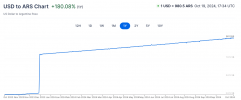FrankPintor
Registered
- Joined
- May 14, 2019
- Messages
- 2,077
- Likes
- 1,980
I hope you don't mind if I say that I don't think this was at the level of your usual thoughtful contributions.Call the peso 10,000/1 USD...it doesn't matter. [...] What's the point of international trade if all of it is a "threat" to domestic industry? Start digging a moat around Argentina and call it a day.
In Argentina, we have the advantage of being able to observe a neighbouring, relatively open (10% tariffs on imports if I recall correctly), market economy. And Chile also has an independent central bank, with a floating exchange rate. So I'm reasonably sure that the Chilean Peso is appropriately valued, and that consumer prices in Chile are also appropriate.
So when Chileans flood into Argentina looking for bargains as in 2023, or Argentinians flood into Chile doing the same, like in 2024, the Argentinian Peso is not appropriately valued. You have a front row seat for all of this in Neuquen, I imagine. If it goes on like this, shops and businesses in the border area (50-100km from the border?) will close down, as everyone rushes past to shop in Chile. That's part of the "threat".
So I think that to remove the Cepo, at least an initial appropriate Peso value must be set, which doesn't make Argentinian businesses unviable overnight with cheap imports flooding in, and which also allows competitively priced exports. No moats. Later on the market will take itself where it wants to go, but getting the initial rate right, and defending it with conventional central bank tools, is critical.

